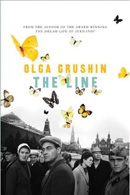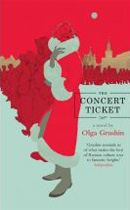
Once there was a line. It was a line leading to a kiosk. What was being sold in the kiosk, nobody knew. But those who stood in line lived in hope that the reward for their waiting would be something interesting or useful. The kiosk was almost always shut with signs saying, "Gone to the parade" or "Closed for accounting. Be back on Monday" or "Out with the flu. Will reopen in January."
Once there was an old man—he enticed people into the line: "They are selling," he says, "whatever you'd most like to have. What would you like?"
Once there was a family living in a nation celebrating the 37th anniversary since the Change. Anna, a teacher of literature, is the first to stumble on the kiosk. Her husband, Sergei, is a musician; he plays the tuba in a government orchestra. Their son, Alexander, 17 years old, is about to graduate from school and longs to escape his grey, dull life. Anna's mother, Maya, who lives with them, had been a prima donna in a ballet company long ago, in a far-away glittering city. Anna is tone-deaf, Sergei has no sense of smell, Alexander is color-blind, and the grandmother does not speak.
Then there is the rumor. The kiosk will be selling tickets to a concert: a concert by the long-exiled, famous and innovative composer, Igor Selinsky. When the family hears the rumor, Sergei, flooded with musical memories of his childhood before the Change, knows that he has to go to the concert. And the grandmother speaks, "I would very much like to go to this concert, please." Anna, Sergei and Alexander spend a year spelling each other in the line at the kiosk hoping to garner a ticket for the concert—each with their own differing motives. In the line, those who wait began to form relationships with others who are there. They become friends, mentors, confidants, potential lovers. Their lives change: they hope, they despair, they become frustrated, they are suspicious of the authorities, they become more aware.
I could not read this book more than a chapter or two at a time—often I was on the verge of tears. At once excruciatingly tender and painful, The Line pulls readers into the quietly desperate lives of those patiently, and impatiently, waiting. Grushin manages to paint a handful of drab, ordinary drudges with extraordinary colors.
Olga Grushin, born in Moscow in 1971, now lives in Washington, DC. Her first novel, The Dream Life of
Sukhanov, was a finalist for the LA Times for First Fiction and for the Orange Award for New Writers.
As the author states in her "Historical Notes," The Line is set in a fictionalized version of Soviet
Russia that incorporates the Stalinist repression, Khrushchev's thaw and Brezhnev's stagnation. But the
novel reflects life in any repressive regime that suppresses individual ideas and creativity. The Line
also affirms the power of art and love to transform lives.

 Putnam, hardcover, 9780399156168
Putnam, hardcover, 9780399156168Published in the UK as The Concert Ticket. Penguin Books, hardcover, 9780670918485
